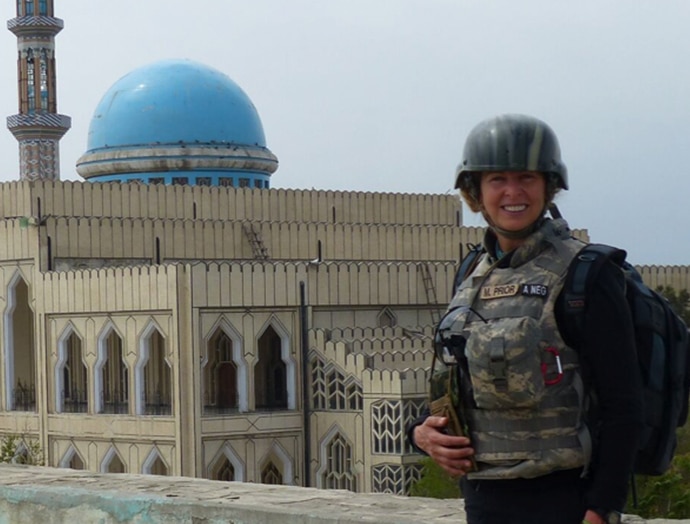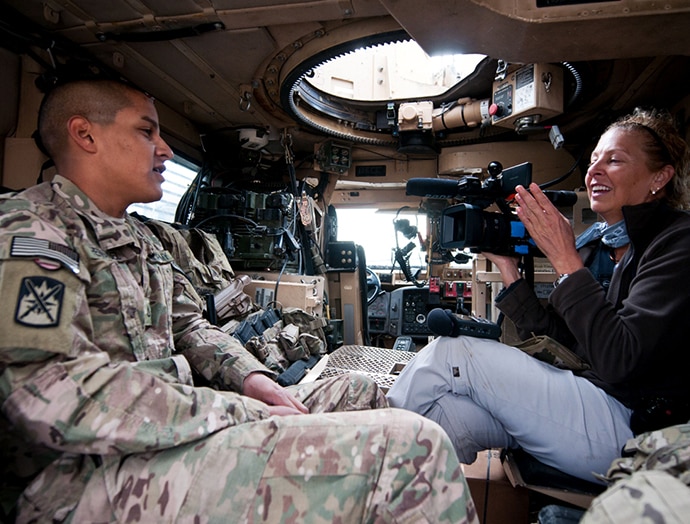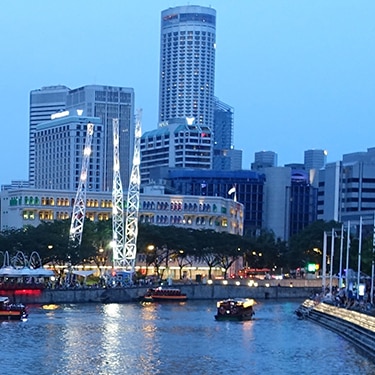Run and Gun: NX100 on test in Mojave Desert
This camera never failed, despite rain, sleet, snow, cold or heat, dust and relentless daily use
Meg Prior knows about shooting in challenging conditions. As a seasoned conflict photographer, videographer, and filmmaker, her career includes multiple deployments to combat zones, resulting in documentary footage with a unique perspective. She’s shot with several Sony handheld cameras over the years including the HXR-NX5 and NX3, and her latest model is the new compact HXR-NX100, which she tested in California’s Mojave Desert.
How would you describe your shooting style?
My current ‘default’ filmmaking styles are ‘run and gun’, and handheld documentary with some set-oriented interviews that allow for prepped and lit set conditions.
What type of cameras have you used for your previous films?
Six years ago, I used Sony’s HXR-NX5 for the first time as a combat videographer. This was a ‘run and gun’ documentary project, following U.S. and coalition forces in Afghanistan beginning in 2010 with the surge of troops. As I deployed from Fort Campbell, clutching my NX5 to cover combat operations, I grew to appreciate the capabilities, dependability and quality of pictures I was getting from the lightweight and compact size camera. I needed a camera I could carry for hours over miles of foot patrols. The NX5 was my introduction to this versatile Sony model and I depended on it! When the NX3 was introduced I clutched it just as hard and depended on its zoom, focus qualities and stability. Now I’ve graduated to its successor, the NX100.

What are some of your first impressions of the NX100?
I tested the NX100 camera in the extreme conditions of Mojave, California, straight out of the box — no magic filter combinations, no reflectors or other paraphernalia. I was able to easily capture moments from handheld positions, through early morning to the low light of dusk.
Tracking shots at speed can break up and pixelate an image, but not with the NX100. The camera captures content in motion from a vehicle (handheld). Perhaps most impressive to me was the footage I shot in high-noon light. The radiant, boiling, desert air that shimmers in waves can be bright and hot, a at light that typically absorbs the moment, but this camera was capable of capturing what I saw while traveling the back roads of the Mojave.
It’s a camera that adapts well to varying conditions and helps me record the spontaneous coverage I seek.
Did you encounter any particularly rough environments with the NX100?
On a nearly daily basis! Indoor conditions can be challenging with unfortunate low light or artificial qualities, just as outdoor noontime sun can negatively impact the ability to capture color and details, but the NX100 consistently delivered. Working with a camera that offers sensitivity and resolution in tough conditions is really important to me.
Outdoor and indoor conditions can present varying challenges. This camera never failed, despite rain, sleet, snow, cold or heat, dust and relentless daily use. It would work from Afghanistan combat missions to Mojave camera testing. It remains dependable.
As a handheld tool in constant use in the field, a camera like this is invaluable in its ability to sustain a beating without the benefit of a case or protection! That has been tested time and again by me over the past several years with the Sony cameras I’ve used.
Are there any specific features of the camcorder you found most useful?
The camera’s features offer helpful settings as well as feedback on lighting conditions. For example, it has automatic recommendations for filter options that are helpful cues in different light conditions.
The camera performs well in all light conditions I have experienced. I don’t often have an opportunity to set a staged scene in documentary work, so using a camera that can quickly be adjusted to lighting conditions is crucial, and that is true of the NX100. The automatic setting is also quite useful if there isn’t time to check shots before rolling.
Audio is invaluable to me, so I always ensure I have a back-up system recording, but the internal audio on the NX100 is great!
The NX100 also has a comfortable and durable housing, and its stabilising features are very impressive.

Your stories have a unique perspective. Is there a camcorder feature you need to achieve your desired look?
Creating intimate shots is important to me. At times I need to capture a broad view, landscape or scenic shot to provide context, but in the next moment I may need a close-up, detail-oriented micro view, of people or their eyes, expression, hands, or gestures, as well as equipment or props. The ability to do so is dependent upon zoom capabilities due to proximity or my focus goals. From a distance, the zoom brings those moments I would have missed into play.
Without the NX100’s zoom capabilities, these are the moments that could easily have been missed or been otherwise unattainable as they were out of focus range.
The camera was a good fit for your creative style?
The camera adapts well to accessing shots through the viewfinder. In a combat environment that’s exactly the challenge I am confronted with in spontaneous daily production conditions.
The camera’s lightweight and easy access control panel make it a natural choice for me to return to, as it provides the consistent seamless benefits I depend upon. The user-friendly menu is great for quick setting changes or review. It is comfortable for me to hold and carry for hours and days!
How did the footage hold up through the post production process?
The Sony camera file format facilitates ease of transcoding to almost any editing system. The quality of the transcode into the editing format is essentially equal to the original final which makes editing the material not only satisfying for clients but also ensures a good representation of my work.
What are your current projects that we can look forward to seeing soon?
In addition to my ongoing projects documenting my time in Afghanistan, I have completed two documentary production projects this past year with independent producers as well as a live concert band short documentary.
All images property of Meg Prior and Outside the Wire Productions unless otherwise stated.

